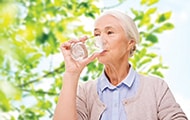Five Important Functions of Water to the Human Body:
1. Water makes up 90% of the human body
2. Water is essential to your energy level and your body’s ability to process its food.
3. Water is necessary to remove toxins from the body through urine, sweat, and the liver.
4. The nervous system depends on ions from water to function.
5. Water helps to prevent UTI’s in senior; which is especially prominent in senior women and can lead to disruptive changes in behavior.
Bodily processes can suffer even if a senior is drinking some water, but not enough. A good rule of thumb is to try to replace the average water output of 2.5 liters of day. We release water through urination, expelling of waste, sweat, and breathing. We should try to replenish our water output regularly. Many agencies like the Institute of Medicine, is recommending to exceed the previously suggested 8 ounces a day and is suggesting a total volume of 3.7 liters (15 cups) for men and 2.7 liters for women in order to maintain a healthy body. Water consumption is particularly important if you regularly consume soda, alcohol, or other substances that dry out the body.
All of this applies to people of any age, but it’s especially important to seniors, who are at higher risk for dehydration than the rest of us. Some of the reasons seniors get dehydrated include:
• Decreased appetite, which leads to less water intake through food and with meals
• Decreased thirst, even when water is needed
• Loss of body mass, which corresponds to a lower water content in the body
• Taking diuretic medicines (medications that dry you out)
• Incontinence, and an intentional decision to drink less water to avoid going to the bathroom
• Mobility issues and difficulty getting a drink
Is your Loved One Dehydrated?
There are signs you can look for that may tell you if your loved one is dehydrated. Many of these signs can be mistaken for other things, and are often ignored—but they are worth noticing and taking seriously. These signs include:
• Frequent headaches
• Dizziness
• Chapped lips or cracking skin
• Nausea
• Confusion or disorientation
• Irritability
• No need to go to the bathroom
Some of these signs can also be symptoms of other common conditions for the senior adults, such as Alzheimer’s disease or diabetes. Dehydration can “work together” with other conditions to make seemingly small medical problems much more serious. It can result in more frequent illness or increased hospitalizaions. Keeping seniors hydrated is vital to their safety.
How to Keep Hydrated
• Serving balanced, healthy meals that seniors enjoy eating
• Knowing which beverage your loved one likes and regularly offering it to them
• Making sure water is within reach at all times in our hydration stations around the community
• Serving smaller, but more frequent beverages so seniors don’t feel they’re having “too much”
• Minimizing coffee, tea or sugary beverages which dry out the body
• Making sure cups are easy to use, with handles or sipping straws as needed
In addition, watch for signs of dehydration and consider dehydration as a factor if a senior is experiencing any health complaints. These are just a few of the small ways to create a better living environment for senior adults and contributes to positive health outcomes.


